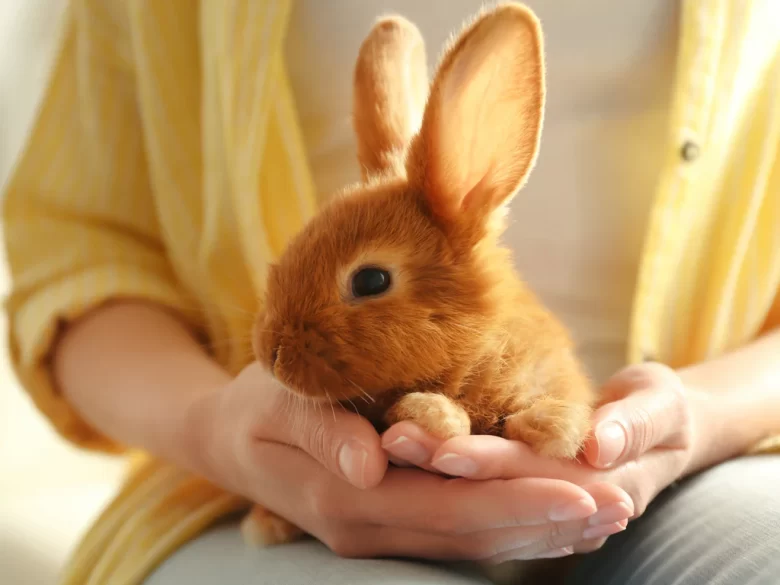Although raising rabbits is becoming increasingly popular, there are still many misconceptions about the proper care of these furry friends. Myths exist in everything from food and life to healthcare and behaviour. It’s time to beat them. The purpose of this article is to dispel some of the most common myths about raising rabbits so that people who already own rabbits or are considering purchasing one are fully informed about their proper care.
Myth 1: Rabbits are Easy to Care for as Pets
Many people think that rabbits are easy to care for and do not require much care. There is no doubt that rabbits require a lot of time, resources and energy. In addition to regular veterinary care, such as vaccinations and spay/neuter surgeries, they also need a balanced diet, regular exercise and mental stimulation. Rabbits also have complex social structures and can feel lonely if they don’t get enough care or friends.
Myth 2: Rabbits Make Great Pets for Children
Rabbits are often considered good pets for children because they are small and cute. But rabbits are fragile and must be handled with care. Because they can be frightened or stressed by loud noises or sudden movements, they are not suitable for young children who may not know how to be careful around their environment. In addition, caring for rabbits is a tough job that should not be left to children.
Myth 3: Rabbits Do Well in Outdoor Cages
Many people believe that rabbits should live outside in cages. Rabbits love being outdoors, but living outdoors can put them at risk of bad weather, animals that want to eat them, and disease. Rabbits should be kept indoors so they can become part of the family and form more bonds with friends. Rabbits that live indoors need a lot of space and regular time to explore the rabbit-free area and to be monitored.
Myth 4: Rabbits Only Eat Lettuce and Carrots
It’s easy to get the wrong idea from photos of rabbits munching on carrots. Hay should be the staple food your rabbit eats, as it is good for his teeth and intestinal tract. Although rabbits can eat vegetables such as lettuce and carrot tops, they should only consume small amounts of these vegetables as part of a varied diet that also includes leafy greens and rabbit food. Due to their high sugar content, carrots should only be eaten occasionally.
Myth 5: Rabbits Don’t Need to Go to the Vet
Another popular myth is that rabbits don’t need a vet. Like other pets, rabbits require regular checkups to ensure their health. They may have a number of health problems, including dental problems, gastrointestinal blockages and respiratory infections, that require immediate medical attention. It is important to find a veterinarian who knows how to care for rabbits because their needs are different from those of cats and dogs.
Myth 6: Rabbits can be Left Alone for Days
Rabbits are social animals and need other rabbits. If they are left alone for long periods of time, they may become sad. While you are away, someone will need to check on your rabbits every day to make sure they have fresh food and water, that their cages are clean, and that they have someone to play with. Furthermore, rabbits can easily get into trouble, so they need constant care to keep them safe.
Myth 7: All Rabbits Like to be Held
Some rabbits like to be held and petted, but not all. Rabbits are individuals with their own tastes and characteristics. Holding a rabbit against its will can cause stress and worry. Remember that your rabbit has limitations and see if he is comfortable being handled. By being patient and gentle with your rabbit, you can build trust, which is important in building a good relationship.
Summary:
Understanding the truth about these myths is important for both your rabbit’s health and the happiness of your rabbit’s parents. Rabbits make great pets, but you need to make an effort to care for them and ensure they are healthy. We hope to give people a more realistic idea of what it’s like to own rabbits by breaking down these myths and encouraging responsible and informed pet ownership.
FAQs:
1. Can rabbits be kept in pairs? If so, what should I consider before doing this?
Yes, rabbits can be kept in pairs, and due to their social nature, they often thrive with company. Before introducing another rabbit, make sure that both rabbits are neutered to prevent reproduction. It is also important to introduce them slowly to a neutral space so that they get along well.
2. What are the main ingredients of a rabbit’s diet?
A rabbit’s diet should consist mainly of hay, which is essential for digestion and dental care. Fresh green leafy vegetables and small amounts of rabbit food should supplement their diet. Foods such as fruits or carrots should be eaten sparingly due to their high sugar content.
3. How often should my rabbit go to the vet?
A veterinarian with experience caring for rabbits should examine them annually. These visits can help detect and prevent health problems early. In addition, rabbits may need to visit the vet for vaccinations or if they show signs of illness.
4. Do rabbits really not need much space?
This is a myth. Rabbits need plenty of space to move, explore and exercise. Their enclosure should be at least four times larger and they should spend additional time in a larger, rabbit-free area for daily exercise.
5. How can I rabbit-proof my house?
Rabbit protection measures include covering electrical wires, protecting furniture and removing poisonous plants and other dangerous objects. Providing plenty of chew toys and ensuring your rabbit has a safe, enclosed space to explore can also prevent destructive behaviour.


